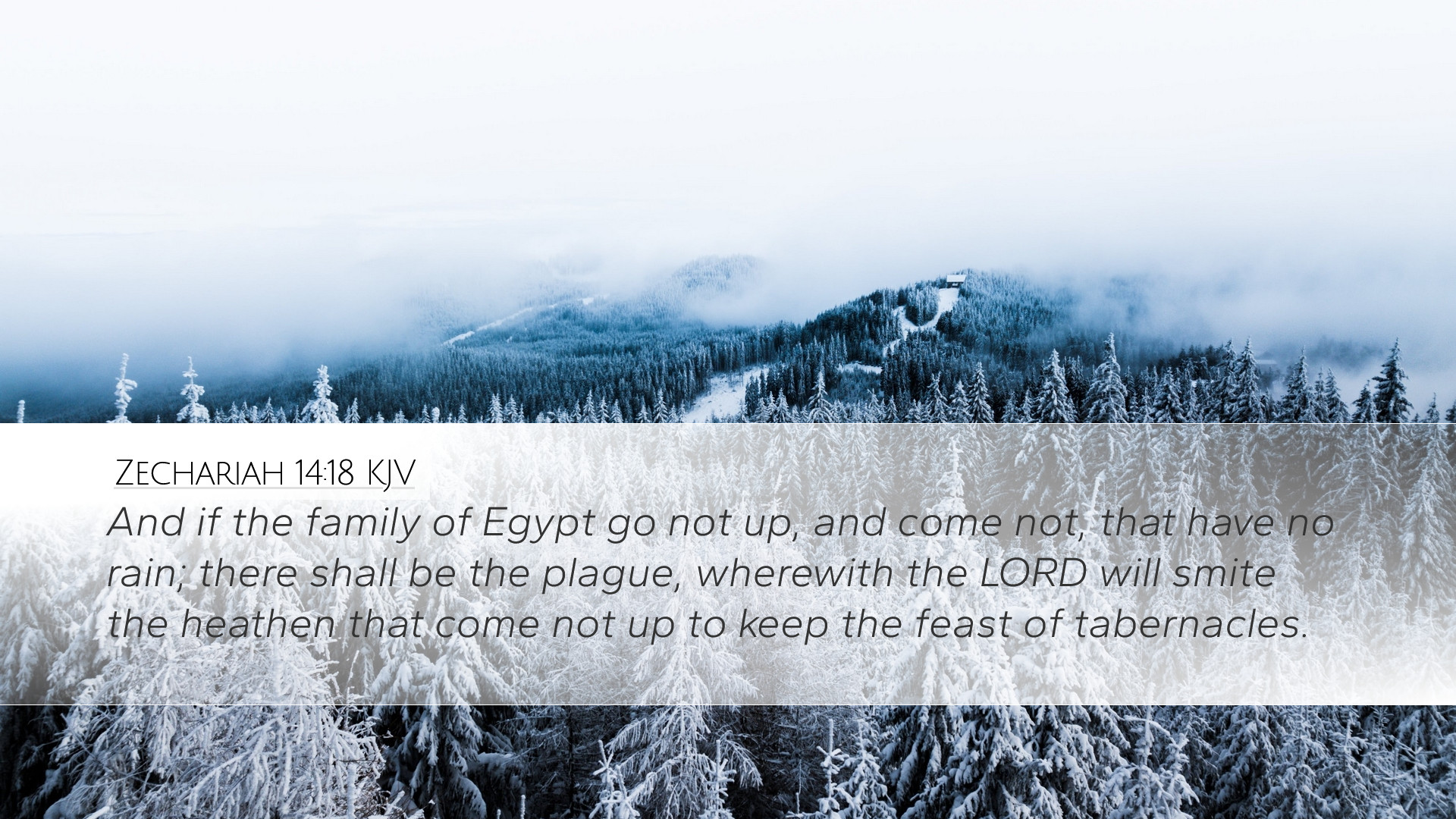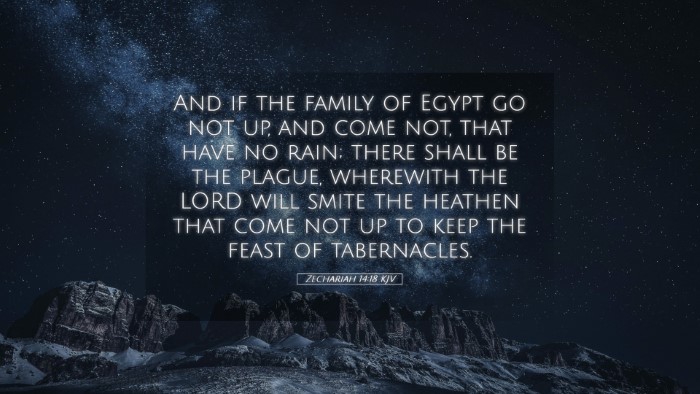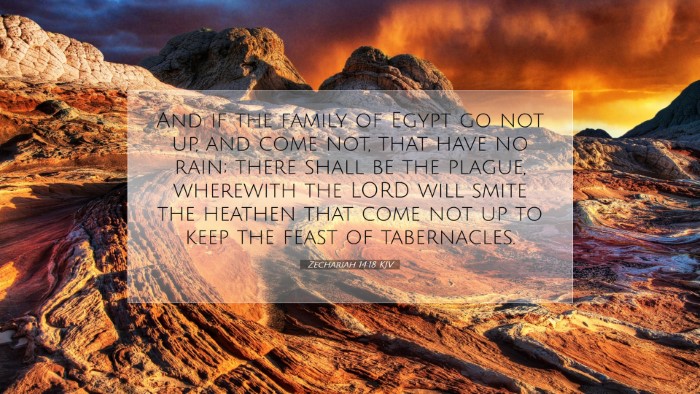Commentary on Zechariah 14:18
Verse: "And if the family of Egypt go not up, and come not, that have no rain; there shall be the plague, wherewith the Lord will smite the heathen that come not up to keep the feast of tabernacles." (Zechariah 14:18)
The verse presents a vivid image of covenantal faithfulness juxtaposed with divine judgment. The context of this verse is rooted in prophetic visions regarding the final restoration of Israel and the future of the nations. It emphasizes the repercussions of rejecting God’s ordained worship, particularly the Feast of Tabernacles, symbolizing joyful thanksgiving and time of remembrance for God's provision.
Interpretative Insights from Public Domain Commentaries
Matthew Henry's Commentary
Matthew Henry emphasizes the importance of the Feast of Tabernacles as a celebration instituted by God. He notes that this feast signifies unity and divine provision. The annual gathering for this feast is not merely a ritual; it fosters a sense of community among God’s people.
Regarding the Egyptians, Henry points out their historical hardness of heart towards God. He articulates that failing to participate in this festival results not solely in a physical drought but also in spiritual desolation, illustrating the broader theme of the necessity of obedience to God's commands. Henry warns that neglecting God’s ways invariably leads to divine retribution and spiritual barrenness.
Albert Barnes' Commentary
Albert Barnes elaborates on the implications of the nations' participation in the Feast of Tabernacles, comparing it to the acknowledgement of God’s sovereignty. He explains that failing to participate exemplifies defiance against divine authority. Barnes highlights that this feast is associated with the harvest, a time of rejoicing for the blessings received from God. Thus, withholding this service from God becomes an act of ingratitude.
The phrase "there shall be the plague" indicates a direct correlation between the people's disobedience and the consequences they will incur. Barnes suggests that this plague serves as both a judgment and a means of drawing people back unto God, showcasing God's mercy even in punishment, aiming to lead the nations to repentance and renewed fellowship with Him.
The Adam Clarke Commentary
Adam Clarke provides a historical backdrop to Zechariah's prophecies, shedding light on the eschatological significance of the verse. He emphasizes the symbolic nature of the Feast of Tabernacles as it relates to the millennial reign of Christ, linking it with both the Jewish tradition and the fulfillment of God’s promises to humanity.
Clarke meticulously interprets the term "the family of Egypt," suggesting it represents the outline of nations that have historically stood against Israel and God's work. He suggests that divine judgment will come upon these nations for their failure to recognize and honor the Almighty, stressing the concept of accountability before God, especially for those far from His covenant blessings.
Theological Reflections
The implications of Zechariah 14:18 resonate deeply in the field of theology, particularly concerning God's sovereignty and human agency. The necessity of the Feast of Tabernacles conveys the significance of worship in community. This gathering is not culture or tradition; it reflects a theological imperative for all peoples, emphasizing that God is the source of all blessings.
Significance of Worship
-
Covenant Relationship:
The significance of this verse extends into understanding the relational dynamics between God and humanity. Obligations to worship highlight humans’ dependent relationship with their Creator.
-
Divine Judgment:
The mention of plague indicates that God’s grace is supplemental to obedience. The absence of divine oversight in worship suggests a severance of fellowship, which results in dire consequences.
-
Inclusivity of the Nations:
This passage reflects the desire for all nations to unite under God's sovereignty, presenting salvation and hope for both Jews and Gentiles alike.
Practical Applications
For pastors, students, and theologians, the lessons derived from Zechariah 14:18 extend beyond mere historical or prophetic insights. They serve as reminders of the centrality of worship in the life of believers.
-
Encouragement for Fellowship:
Encouraging communities to gather for worship can strengthen faith and foster unity among church members, resonating with the purpose of the Feast of Tabernacles.
-
Awareness of Accountability:
Believers must recognize that they are accountable to God for their lives, including their participation in worship. This fosters a deeper commitment to living out their faith authentically.
-
Outreach and Inclusion:
This passage embodies the call to reach out to others, especially those who have not yet acknowledged God's sovereignty, making it imperative to include all in worship.
Conclusion
In summary, Zechariah 14:18 serves as a powerful reminder of the importance of worship, obedience, and divine accountability. As reflected in the insights from Matthew Henry, Albert Barnes, and Adam Clarke, this verse transcends its historical context to present sobering implications for Christians today. It challenges believers to remain faithful, encourages corporate worship, and highlights the availability of God’s grace even in the face of judgment.


